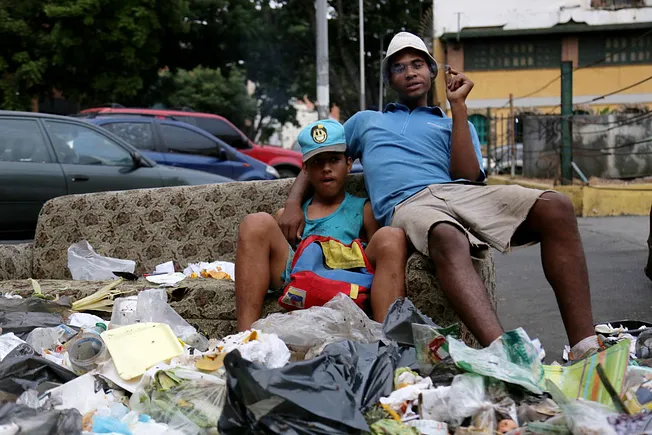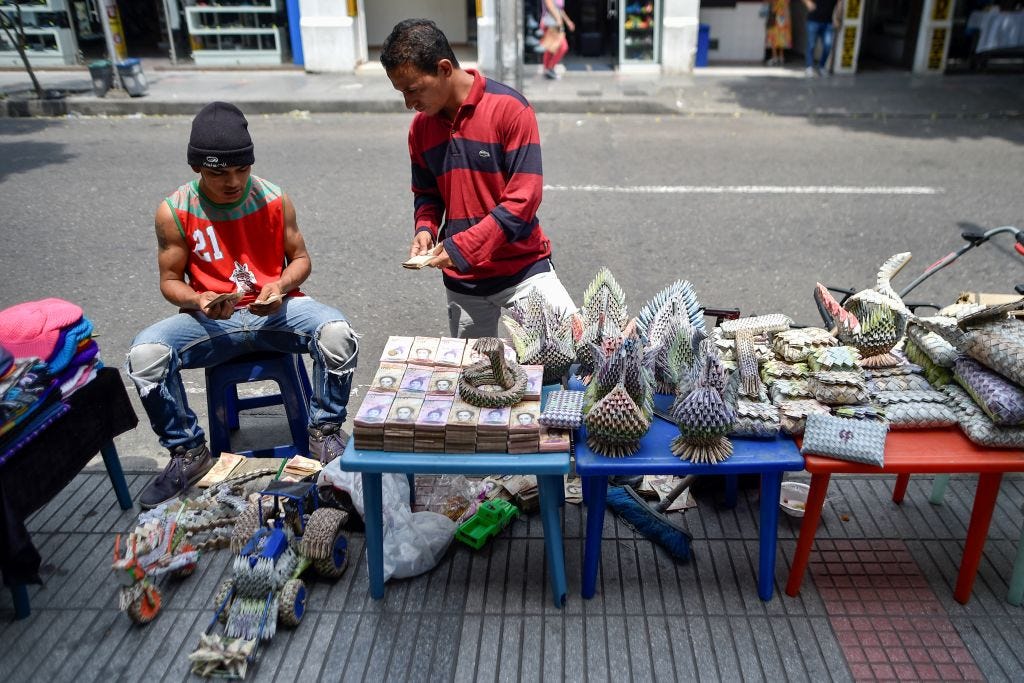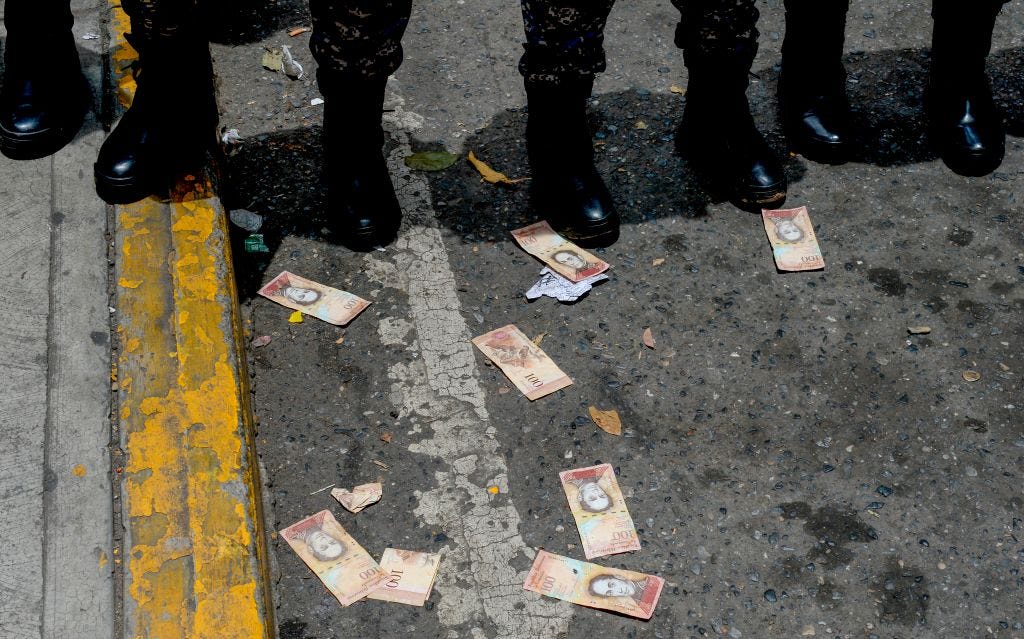Francis Foster

Twenty or so years ago, I was visiting Caracas, the capital of Venezuela—where my mother is from and my grandparents still live—and I met a girl at a party who I instantly connected with. Her name was Diana. We flirted for a bit, but my best friend also had a crush on her, so I backed off. Years later, I returned to Venezuela and wondered if she was still around, and still single.
“Oh, you didn’t hear?” my friend said. “She died.”
Just months before, he told me, she’d been in a car chase with a group of thugs, who were trying to rob and kidnap her. She lost control of her vehicle and it crashed, bursting into flames. No attempts were made to save her and she burned to death in the inferno.
Without skipping a beat, my friend ended his story by saying, “Anyway, man, you want a beer?”
This is the Venezuela I know.
It’s easy to look at the news today—with hundreds upon thousands of Venezuelan migrants flooding into the U.S. over the last few years—and think that something drastic and horrible must’ve happened in Venezuela recently. But the mass exodus is the result of decades of corruption and violence. And what’s truly remarkable isn’t how many people are leaving, but why so many are staying.
My friend’s reaction to the brutal murder of a young woman speaks volumes about how Venezuelans have learned to survive. When you live in a society where the price of life is cheap, it’s not a big deal when awful things happen. Everyone in Caracas knows at least one person who’s been kidnapped. It’s just a part of life, like jury duty. You’re kidnapped on a Monday, they hand you back on a Wednesday, you take a couple of days to get your affairs in order, and then you’re back to work the following Monday.
My mom left the country 45 years ago—after meeting my dad, who grew up in the UK—but I kept going back. I went to see my grandparents, who continue to live there, and old friends I’ve known since childhood. (I was born in the UK, but every Christmas of my childhood was spent in Venezuela.) But by 2005, I’d had enough. I couldn’t live with the constant fear. And though I pride myself on my sense of humor—I’m a professional stand-up comic—even I don’t have the gallows humor that’s become second nature, almost a defense mechanism, to so many friends and family members.
Not long before I left Venezuela for good, my friend Ernesto was robbed at gunpoint on a busy street in Caracas. He was at an ATM and felt a gun shoved into his back. “Take everything out of your bank account,” a gruff voice behind him demanded. “Any stupidity from you and I’ll put a bullet through your spine and you’ll never walk again.”
Ernesto took a deep breath. Every Venezuelan knows what to do in these circumstances. It’s drilled into you from childhood, one of the many lessons you have to learn if you want to survive in Caracas. He gave them what they wanted, and hoped for the best.
When he turned to see his assailants making an unhurried retreat, he realized that they were police officers. They even drove away in a police car, not at all concerned with the dozens of witnesses who saw them rob a civilian in broad daylight.
A few months later I ran into Ernesto at a party, where he was regaling the crowd with his tale of getting mugged by cops. His audience roared with laughter. Every line was crafted like a stand-up comedian’s well-honed routine. He was in his element, basking in the glow of an appreciative crowd.
More than seven million Venezuelans have left the country as of August. But what’s truly remarkable is why so many stay.
It reminded me of that famous line by the English poet Thomas Gray: “Moody Madness laughing wild amid severest woe.”
Venezuelans have a saying: A llorar al valle. Roughly translated, it means “Go and cry to the valley.” When no one will listen to your problems, you “go and cry to the valley,” because it’s the only thing that’ll listen. There have been many tears shed to metaphorical valleys up and down the country, whether it’s families with relatives who have been murdered by armed criminals, or loved ones who have disappeared because they dared to criticize the regime.
More than seven million Venezuelans have left the country as of August, fleeing their homeland to escape poverty, hyperinflation, violence, and seemingly endless political corruption. Last month, President Biden granted temporary legal status to the 472,000 migrant Venezuelans already living in the U.S., protecting them from deportation for at least the next 18 months. But leaving home was never the first choice for many of them, and you can sense the yearning for what’s been lost in their wonderfully dark sense of humor.
I have a cousin who fled Venezuela, and when I’ve asked his favorite thing about living in America, he usually replies with just two words: “Coca-Cola.” Thanks to a diet of processed food and refined sugar, his physique is far more American than Venezuelan. We joke that he desperately needs to return to his home country for a few months to do the “communism fat camp.”
My uncle, who still lives in Venezuela, has type 2 diabetes, and he credits the communism diet with why he still has his original toes. “It’s amazing what can be achieved when you can’t afford to eat and the tap water has more parasites than the ruling class,” he told me with a big, hearty laugh.
I have another cousin, a journalist who wrote pieces criticizing Venezuela’s president Nicolás Maduro, and who was promptly threatened by the regime’s thugs. They informed him, in unflinching detail, what would happen to him if he continued to publicly voice his opinions. He fled in terror to Uruguay. But when I called him, he wasn’t grateful to have escaped. He missed home. And he insisted that Uruguay is one of the most boring countries on the planet. “I’m surrounded by cows,” he complained.
Caracas may be one of the murder capitals of the world. Ninety percent of the nation lives in poverty, according to the National Survey of Living Conditions. One in three Venezuelan children suffer from malnutrition, according to the National Academy of Medicine. Smuggling, whether it’s gas, food, or human beings, represents 20 percent of the Venezuelan economy. But hey, at least it’s exciting. And there’s more to do than stare at cows.
A general election is happening in Venezuela early next year, and there are already murmurs that Maduro could be unseated, ending almost a quarter century of socialist government. But I’m not optimistic. The corruption in Venezuela is a cancer and it’s metastasized over the last several decades. I love Venezuela and I want to return someday. But I have faith that the country will have a fair and honest election in 2024 about as much as I believe the communist diet is healthy and saved my uncle’s toes.
Not long ago, an old family friend named Henry flew from Venezuela to visit me in London. My parents—who are now both in their mid-70s—joined us for dinner, and during one of Henry’s stories, my dad leaned in close and said, “I’m sorry, Henry, would you mind speaking up? I’m getting older and I can’t hear you.”
Henry just sighed. “My apologies,” he said. “In Venezuela, we’re just used to whispering.”
The Venezuelan bolívar is worth less than three cents to the U.S. dollar.
Those are the subtle ways that authoritarianism chips away at you. You don’t even realize anymore that every conversation is a whisper. It becomes rote, like when you’re taught to look both ways before crossing the street and you don’t even think about it anymore. You know what the repercussions will be if you step out of line. You whisper because it’s a choice between life or death.
But the fear and the tears always give way to laughter again, because that’s how we cope. At our dinner with Henry, we talked about how el bolívar fuerte—the Venezuelan currency, roughly translated as “the strong Bolívar”—is on the decline yet again. The exchange rate is around 0.028 in U.S. dollars. Toilet paper is now worth more than bolívar fuerte. And you can’t replace toilet paper with bolívar, although I’m sure someone has tried. We laughed about the state of affairs, but it’s the way you laugh about an old relative whose life has fallen apart, who’s living on the streets and doing drugs, and you’re not sure how to help him anymore.
The country we all knew from our childhoods no longer exists. It lives on only in our memories. When we bump into other Venezuelans, we share stories of the country we loved, the places we used to visit, and the people we used to know. And most importantly, we laugh—the soul cleansing, cathartic laughter that comes from people finding a way to negotiate a path through a shared trauma.
It’s the only thing that prevents us from spending all of our lives crying to the valley.


No comments:
Post a Comment